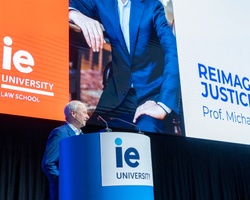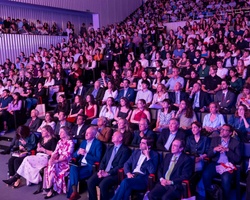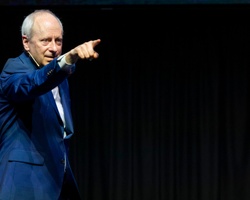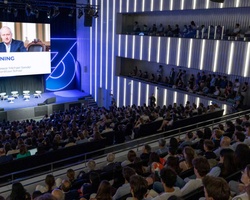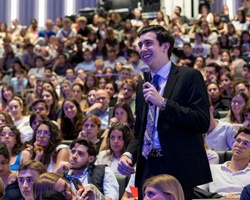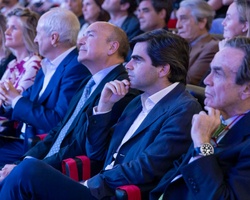- Home
- We Are Law School
- News
- Renowned Harvard Professor Michael J. Sandel Presents Civic Debate On Justice In The Modern World At Ie Law School Event
Renowned Harvard professor Michael J. Sandel presents civic debate on justice in the modern world at IE Law School event
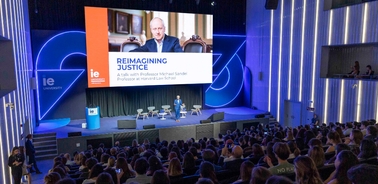
The distinguished political philosopher and professor of Harvard Law School visited IE Law School to dissect the meaning of justice and its importance to our society today.
What is a just society? The question of who in our society deserves what—and why—is a big one. It’s one that acclaimed professor Michael J. Sandel put to more than 600 attendees during IE Law School civic debate themed “Reimagining Justice” on April 25, held at IE Tower.
Sandel is a political philosopher and professor of Harvard Law School and recipient of the 2018 Princess of Asturias Award for Social Sciences. He has been described as “the most relevant living philosopher, a rockstar moralist and currently the most popular professor in the world.”
Attended by law students, faculty members and prominent personalities of the legal world, this was one of the most anticipated events of the year. IE Law School Dean, Soledad Atienza, kicked off the proceedings by saying, “For every law school, justice is the greatest value.” As she explained, forums like this serve to drive the point home: “We inspire students to make a positive impact in society and promote justice and the rule of law.”
Dissecting justice
Sandel asked the audience to wrestle with current notions of how we dole out rewards. The most commonly held model, a meritocracy, stipulates that people should be rewarded according to merit rather than aristocracy or nepotism. But how much of achievement is based on luck and good fortune, and how much on hard work?
In a meritocracy, if all chances are equal, the winners of this ‘race’ deserve their winnings. But is this truly just? Sandel used the example of the famous footballer Ronaldo to make his point. Ronaldo was recently signed by Saudi Arabian club Al Nassr for a whopping $200 million a year.
Sandel asked the audience to think about their favorite teacher in high school: “Does Ronaldo deserve to earn more than 2000 times what your favorite teacher makes? Why?” he asked.
Various IE Law School students in attendance took turns explaining their positions. Alexandra, in particular, felt that the athlete didn’t deserve to make that much. “Ronaldo makes this amount because of market forces,” she explained, adding, “He’s the most in-demand football player [in the world]. It’s a reflection of the economic forces of supply and demand. I don't think they reflect the value of activities performed.”
Another student, Jacob Dane, rebutted: “When it comes to the forces of demand—if something is in demand, it creates social utility. The more in demand something is, the more it’s valued. But true value is not objective. So, since value is subjective and no one person can say how much something should be valued, the aggregate of the perception of all values [in other words, supply and demand] is the best way to measure it.”
Luck or just deserts?
Sandel continued the conversation by delving into another aspect of Ronaldo’s salary—luck on two fronts. According to the professor, there are two elements, or contingencies, to luck: first, being lucky enough to be born with a talent which, in this case, is the ability to play football well. And secondly, the luck to live in a society that prizes those talents at that specific point in time. Ronaldo, then, was lucky enough to be born in a time and place where football is very popular. If he’d been born during a time when painting frescos were what was the most prized ability, his story might have been very different.
Sandel said that as meritocratic attitudes to success become more prominent, they can “reinforce pride, arrogance and hubris” in those who come to believe their success is purely by their own merit and not a combination of lucky breaks.
“And they also reinforce a sense in those left behind that ‘my failure must be my fault’,” said Sandel. “That is one of the dark sides of the meritocratic ideal. What’s at stake in the debates about meritocracy and justice isn’t only about what makes a just society, but what makes a good society.”
“What’s at stake in the debates about meritocracy and justice isn’t only about what makes a just society, but what makes a good society.”
Michael J. Sandel
Shaping future leaders
To end the session, a Q&A session was held with students of the Bachelor of Laws (LL.B.), including Alexia Collot d'Escury Ariza, Gryphon Harry Gurin and Desiree Rommy Schottenhamel. The session was led and concluded by David Meshaka, student of the Double LLM in Legal Practice & Technology Law. IE Law School’s Vice-Dean, Eugenia Castrillón, asked Sandel what he thinks the faculty should do to best equip its students to be responsible future leaders.
“What I recommend is what I can see you’re already doing very well,” Sandel replied, “Which is to cultivate the ability of students to reason together in public about hard, ethical and civic questions related to justice and law […] If you can cultivate that capacity, this law school will be making a great contribution to the future of civic life.”
You can watch the talk in its entirety here.
